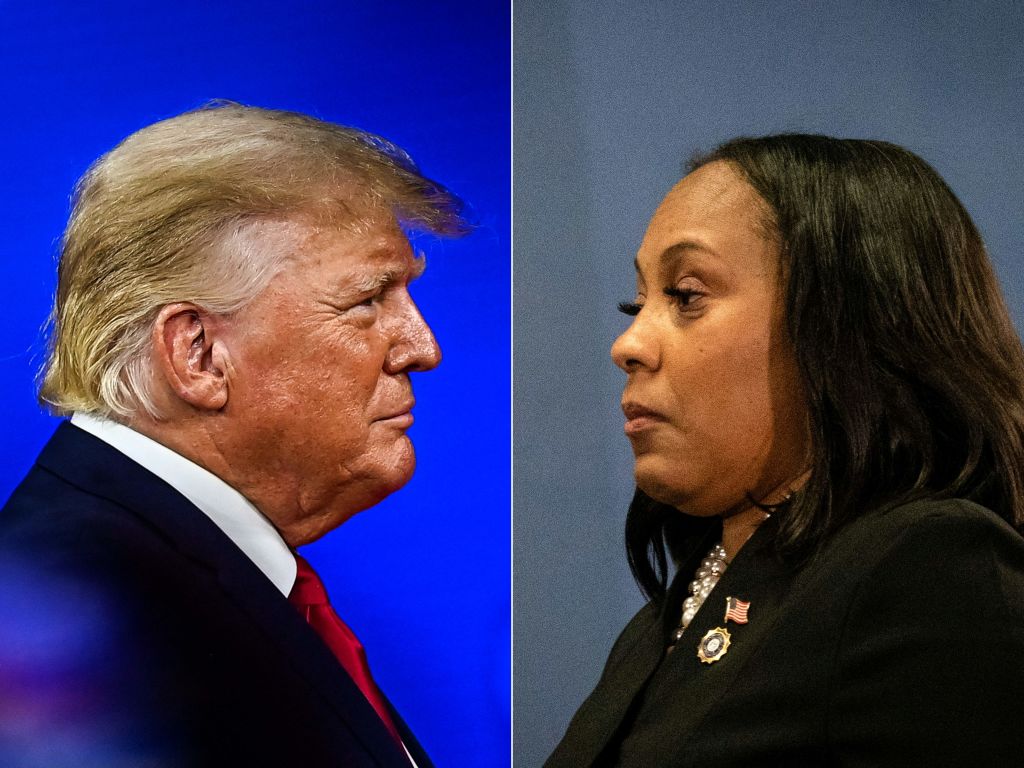Welcome back to The Collision! We took a brief hiatus while the internal machinations in the House Republican conference took center stage, Sarah had a little time away from work with her newborn, and Mike went on vacation. And while there doesn’t seem to be any chance Congress is going to get its act together any time soon, we’re at least both back in the saddle.
We want to use this week’s issue to lay out a roadmap for readers—and ourselves—of what the next several months of legal maneuvering and presidential politics will look like. But first, let’s play some catch-up.
The Docket
- On Wednesday, a judge agreed to drop a federal gun charge against Hunter Biden, per a request last month from prosecutors. The removed charge was a vestige of that ill-fated plea deal federal prosecutors and President Joe Biden’s son had seemingly signed on to before the entire agreement collapsed this summer. The younger Biden faces a new indictment with three gun charges unrelated to the dropped charge.
- Last week, Hunter Biden pleaded not guilty in a Delaware federal court to those three gun charges. According to Reuters, Biden arrived at the Wilmington courthouse in a six-car motorcade and with what appeared to be multiple Secret Service agents. As conditions of his release, pending trial, Biden is required to remain drug-free, seek employment, and clear all travel with a probation officer. Biden’s lawyer Abbe Lowell indicated he would seek to have the charges dismissed, and his team will have until November 3 to file such a motion.
- Speaking of requests for dismissal, Donald Trump’s legal team filed just such a motion last week in relation to his charges on election interference in Washington, D.C., with his lawyers arguing Trump is “absolutely immune” from prosecution because his alleged actions took place while he was president and chief executive overseeing the Justice Department. The motion to dismiss came on October 5, the same day Trump’s lawyers also moved to dismiss the New York criminal case surrounding hush money payments to Stormy Daniels.
- Meanwhile, Trump’s bruising political style continues to do him no favors inside the courtroom. Last week, the New York judge presiding over a civil case involving allegations Trump committed business fraud—a case we haven’t even discussed here at The Collision!—issued a limited gag order requiring Trump to delete a post on his social media site that castigated a clerk working for Judge Arthur Engoron, alleging the clerk was politically biased against the former president. The post included a photo of the clerk standing next to Democratic Majority Leader Sen. Chuck Schumer. “Personal attacks on members of my court staff are unacceptable, not appropriate, and I will not tolerate them,” Engoron said after warning everyone that he will issue sanctions on those who disparage court officials. Trump’s request to pause the ongoing civil trial was denied last week.
A Full Calendar Ahead
With Donald Trump facing four indictments and a primary season, there’s a lot of upcoming dates to keep track of. When will the trials start? What sort of additional important motions can we expect, and by when will they be filed? How will the trials affect the caucuses and primaries, and vice-versa?
With the caveat that some (and maybe several) of these dates are not set in stone, we thought it’d be helpful to provide a chronological timeline for what to expect and when to expect it. This isn’t an exhaustive list, but hopefully it’s a start for readers to orient themselves around this very unusual start to a presidential election.
October 23, 2023: Trump’s co-defendants in Georgia go to trial
The first trial related to Donald Trump’s legal problems is starting in less than two weeks—but it doesn’t involve Trump himself. Two of his associates, attorneys Kenneth Chesebro and Sidney Powell, are scheduled to begin their racketeering trial in Fulton County, Georgia, by the end of this month—though both defendants’ attorneys are still trying to get the charges thrown out. You can expect these proceedings to be a preview of Trump’s own Fulton County trial, but because District Attorney Fani Willis was unable to try all 19 defendants together, we still don’t know when Trump’s trial in Georgia will begin.
January 15, 2024: The Iowa caucuses
Most of Trump’s legal issues will remain quiet through the end of the year. But two weeks into 2024, Iowa will host the GOP’s first nominating contest for president. At least thus far, the indictments and accusations don’t appear to have hurt the former president with Hawkeye State Republicans. A well-respected Des Moines Register/NBC News poll of the state in August found not only that Trump held a commanding lead among likely caucusgoers in Iowa, but that his indictment in Georgia—which was announced while the poll was in the field—actually increased his support. Trump lost the Iowa caucuses in 2016 to Sen. Ted Cruz of Texas.
Late January, 2024: The New Hampshire primary
The Granite State hasn’t yet set an official date for its first-in-the-nation primary election, but in the past it’s been held roughly a week after the Iowa caucuses. In 2016, Trump’s New Hampshire victory kicked off his long string of plurality wins that earned him the GOP nomination, and the current RealClearPolitics polling average suggests he’s even more popular with Republican primary voters there now, clocking in more than 30 points ahead of his closest opponent in the state, Nikki Haley.
February 8, 2024: The Nevada caucuses
February 24, 2024: The South Carolina primary
March 2, 2024: The Idaho caucuses and Missouri caucuses
This is a new and odd development for these two states, whose Republican-led legislatures scrapped their presidential primaries, only to discuss reinstating them—but never get around to actually doing so. As a result, Idaho and Missouri won’t participate in the big Super Tuesday primaries later in March and instead will hold caucuses on March 2. These will likely be dominated by high-intensity voters in an otherwise low-turnout race, which at this point would almost certainly help consolidate support for Trump, who retains some of the more dedicated supporters within the primary field.
March 4, 2024: Trump’s election interference trial in Washington, D.C., begins
If the status quo continues in the Republican primary, Trump will have begun the primary season with big victories in each early state—only to find himself on trial in the nation’s capital just before Super Tuesday. Judge Tanya Chutkan set the date back in August and had no interest in granting the Trump legal team’s request to delay it until 2026. In fact, Chutkan has threatened to move the trial date even earlier if she deems it necessary to protect the integrity of the process—but this is a threat she is unlikely to deliver on.
The trial is more likely to be delayed, in fact, because of the legal complexities of the case and the sheer number of witnesses to whom the Trump team will be entitled to talk before the trial begins. Questions about the meaning and scope of one of the statutes that Trump is charged with violating are currently pending at the Supreme Court related to a different January 6 defendant.
March 5, 2024: Super Tuesday
This year, 13 states will hold Republican presidential primaries, plus Alaska and Utah will hold caucuses, making this the day of the cycle with the most delegates up for grabs.
March 15, 2024: Georgia, Mississippi, Washington primaries; Hawaii caucuses
March 19, 2024: Arizona, Florida, Illinois, Kansas, Ohio primaries
March 25, 2024: Trump’s hush-money trial in New York begins
The first of Trump’s criminal indictments was also the first to have a trial set, way back in May of this year. The former president has been indicted three times since then, however, and his legal plate is getting pretty full. Judge Juan Merchan suggested last month he was open to moving the trial date given Trump’s “rapidly evolving trial schedule,” but Merchan also said he would not consider changing the start date until February of next year. So for now, we’re sticking with what’s on the calendar.
April 2 – June 4, 2024: The rest of the primaries
The remaining states will hold their presidential nominating contests over the course of three days in April, three days in May, and one final day in June. If Trump remains in the lead for the Republican nomination by this point, his legal issues are clearly not negatively affecting his position in the primary.
May 20, 2024: Trump’s classified documents trial in Florida begins
The Mar-a-Lago documents trial is currently scheduled to start two-and-a-half months after the special counsel’s election interference case in Washington. The date represents a compromise between both sides—a longer wait than Special Counsel Jack Smith wanted, but not the delay requested by Trump’s team that would have pushed the trial beyond the 2024 presidential election.
This trial could also get pushed back, however, as Trump’s team has complained that it is having trouble accessing the troves of classified documents necessary to prepare his defense. Regardless, this May trial is scheduled to begin at the tail end of the primary season, meaning it’s unlikely to hurt Trump with Republican primary voters if he continues to lead the pack. But the trial kicking off toward the beginning of the general election season could be bad political timing for Trump, especially since the case is considered the most straightforward of the four he faces.
Verbatim
Sometimes, what newsmakers on our beat say—either in the courtroom or on the campaign trail—speaks for itself. In this section, we’ll provide a bit of context and then give you what that person said, well, verbatim.
According to CNN, two of the prosecution’s witnesses in Chesebro/Powell’s Fulton County trial are Republican National Committee Chair Ronna McDaniel and radio host/conspiracy theory purveyor Alex Jones. Judge Scott McAfee signed orders compelling both to testify.
“Ronna McDaniel possesses unique knowledge concerning communications between herself and Donald Trump as well as communications between herself and John Eastman regarding the conspiracy to cause certain individuals to falsely hold themselves out as the duly elected and qualified presidential electors,” McAfee wrote. “Alex Jones possesses unique knowledge concerning communications between himself and Kenneth Chesebro and other known and unknown individuals involved in the multi-state, coordinated efforts to influence the results of the November 3, 2020, presidential election in Georgia and elsewhere.”
One More Thing
This is why punctuation matters:








Please note that we at The Dispatch hold ourselves, our work, and our commenters to a higher standard than other places on the internet. We welcome comments that foster genuine debate or discussion—including comments critical of us or our work—but responses that include ad hominem attacks on fellow Dispatch members or are intended to stoke fear and anger may be moderated.
With your membership, you only have the ability to comment on The Morning Dispatch articles. Consider upgrading to join the conversation everywhere.